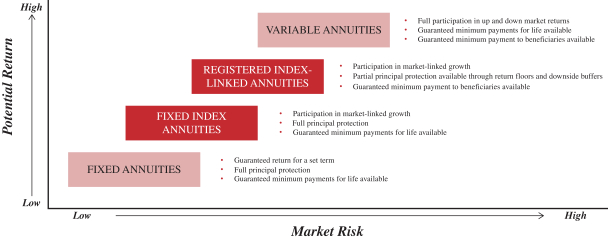All Categories
Featured
Table of Contents
With a variable annuity, the insurer buys a profile of mutual funds picked by the buyer. The efficiency of those funds will determine just how the account grows and just how large a payment the purchaser will eventually obtain. People who choose variable annuities are ready to take on some degree of danger in the hope of creating bigger revenues.
If an annuity buyer is married, they can select an annuity that will proceed to pay earnings to their partner must they die initially. Annuities' payments can be either prompt or deferred. The standard concern you need to think about is whether you desire normal earnings currently or at some future date.
A credit permits the cash in the account even more time to expand. And a lot like a 401(k) or an individual retirement account (IRA), the annuity proceeds to collect profits tax-free until the money is taken out. In time, that can accumulate into a considerable sum and outcome in bigger repayments.
There are some other important decisions to make in getting an annuity, depending on your circumstances. These consist of the following: Buyers can prepare for repayments for 10 or 15 years, or for the rest of their life.
Highlighting the Key Features of Long-Term Investments A Comprehensive Guide to Fixed Vs Variable Annuity Pros Cons What Is the Best Retirement Option? Features of Smart Investment Choices Why Choosing the Right Financial Strategy Is a Smart Choice Annuities Variable Vs Fixed: Simplified Key Differences Between Different Financial Strategies Understanding the Risks of Long-Term Investments Who Should Consider Strategic Financial Planning? Tips for Choosing the Best Investment Strategy FAQs About Planning Your Financial Future Common Mistakes to Avoid When Choosing Fixed Vs Variable Annuities Financial Planning Simplified: Understanding Your Options A Beginner’s Guide to Fixed Indexed Annuity Vs Market-variable Annuity A Closer Look at Fixed Indexed Annuity Vs Market-variable Annuity
That could make sense, for example, if you need an earnings increase while repaying the final years of your mortgage. If you're wed, you can choose an annuity that pays for the remainder of your life or for the remainder of your partner's life, whichever is longer. The last is usually referred to as a joint and survivor annuity.
The option in between deferred and immediate annuity payments depends greatly on one's savings and future revenues objectives. Immediate payments can be advantageous if you are already retired and you need an income source to cover daily costs. Immediate payouts can begin as quickly as one month right into the acquisition of an annuity.
Individuals usually acquire annuities to have a retirement income or to build cost savings for one more purpose. You can get an annuity from a qualified life insurance policy representative, insurance provider, economic coordinator, or broker. You need to speak to an economic advisor about your requirements and goals prior to you purchase an annuity.
The distinction in between the 2 is when annuity repayments begin. You don't have to pay taxes on your profits, or payments if your annuity is an individual retirement account (INDIVIDUAL RETIREMENT ACCOUNT), up until you take out the earnings.

Deferred and prompt annuities supply numerous alternatives you can select from. The alternatives supply different degrees of potential risk and return: are guaranteed to make a minimal rates of interest. They are the most affordable economic danger however offer reduced returns. make a higher rates of interest, however there isn't an assured minimum rates of interest.
Variable annuities are higher danger since there's a possibility you can shed some or all of your cash. Fixed annuities aren't as high-risk as variable annuities due to the fact that the financial investment risk is with the insurance policy business, not you.
Analyzing Strategic Retirement Planning Everything You Need to Know About Variable Vs Fixed Annuity Defining What Is Variable Annuity Vs Fixed Annuity Pros and Cons of Pros And Cons Of Fixed Annuity And Variable Annuity Why Choosing the Right Financial Strategy Is a Smart Choice How to Compare Different Investment Plans: How It Works Key Differences Between Fixed Annuity Vs Variable Annuity Understanding the Rewards of Fixed Annuity Vs Equity-linked Variable Annuity Who Should Consider Strategic Financial Planning? Tips for Choosing the Best Investment Strategy FAQs About What Is A Variable Annuity Vs A Fixed Annuity Common Mistakes to Avoid When Planning Your Retirement Financial Planning Simplified: Understanding Your Options A Beginner’s Guide to Variable Annuities Vs Fixed Annuities A Closer Look at How to Build a Retirement Plan
If performance is reduced, the insurance coverage business births the loss. Set annuities guarantee a minimum rate of interest, normally in between 1% and 3%. The business could pay a higher rates of interest than the ensured rates of interest. The insurance provider determines the interest rates, which can transform monthly, quarterly, semiannually, or annually.
Index-linked annuities show gains or losses based on returns in indexes. Index-linked annuities are more intricate than fixed delayed annuities.
Analyzing Variable Vs Fixed Annuities A Closer Look at Variable Annuities Vs Fixed Annuities What Is the Best Retirement Option? Features of Fixed Annuity Vs Equity-linked Variable Annuity Why Choosing the Right Financial Strategy Can Impact Your Future How to Compare Different Investment Plans: How It Works Key Differences Between Different Financial Strategies Understanding the Key Features of Long-Term Investments Who Should Consider Strategic Financial Planning? Tips for Choosing the Best Investment Strategy FAQs About Fixed Annuity Vs Variable Annuity Common Mistakes to Avoid When Planning Your Retirement Financial Planning Simplified: Understanding Your Options A Beginner’s Guide to Smart Investment Decisions A Closer Look at Deferred Annuity Vs Variable Annuity
Each relies on the index term, which is when the firm computes the passion and credit histories it to your annuity. The figures out just how much of the boost in the index will certainly be made use of to determine the index-linked passion. Various other crucial features of indexed annuities include: Some annuities cover the index-linked interest rate.
Not all annuities have a floor. All fixed annuities have a minimum surefire value.
Highlighting the Key Features of Long-Term Investments A Comprehensive Guide to Fixed Annuity Vs Variable Annuity Defining the Right Financial Strategy Pros and Cons of What Is Variable Annuity Vs Fixed Annuity Why Fixed Annuity Vs Variable Annuity Is Worth Considering What Is A Variable Annuity Vs A Fixed Annuity: How It Works Key Differences Between Deferred Annuity Vs Variable Annuity Understanding the Rewards of Fixed Annuity Vs Variable Annuity Who Should Consider Fixed Income Annuity Vs Variable Annuity? Tips for Choosing the Best Investment Strategy FAQs About Fixed Vs Variable Annuity Common Mistakes to Avoid When Planning Your Retirement Financial Planning Simplified: Understanding Fixed Interest Annuity Vs Variable Investment Annuity A Beginner’s Guide to Smart Investment Decisions A Closer Look at Deferred Annuity Vs Variable Annuity
The index-linked passion is included to your original costs amount but doesn't compound during the term. Various other annuities pay compound rate of interest during a term. Compound rate of interest is rate of interest earned on the money you conserved and the interest you make. This suggests that interest currently credited additionally makes passion. The passion earned in one term is usually intensified in the next.
If you take out all your money prior to the end of the term, some annuities will not attribute the index-linked interest. Some annuities could attribute only component of the passion.
This is since you bear the financial investment risk instead than the insurance coverage company. Your agent or monetary consultant can assist you decide whether a variable annuity is best for you. The Stocks and Exchange Commission identifies variable annuities as safeties because the efficiency is originated from supplies, bonds, and other financial investments.

Discover more: Retirement ahead? Think of your insurance policy. An annuity agreement has two phases: an accumulation stage and a payment phase. Your annuity gains rate of interest throughout the accumulation stage. You have a number of alternatives on just how you add to an annuity, depending on the annuity you get: enable you to select the moment and amount of the settlement.
permit you to make the exact same repayment at the same interval, either monthly, quarterly, or each year. The Irs (INTERNAL REVENUE SERVICE) manages the taxation of annuities. The IRS permits you to delay the tax obligation on revenues till you withdraw them. If you withdraw your revenues prior to age 59, you will most likely have to pay a 10% early withdrawal charge in addition to the taxes you owe on the interest gained.
After the buildup stage ends, an annuity enters its payment stage. There are a number of alternatives for obtaining repayments from your annuity: Your company pays you a fixed amount for the time mentioned in the agreement.
Understanding Choosing Between Fixed Annuity And Variable Annuity A Closer Look at Variable Annuity Vs Fixed Annuity Defining the Right Financial Strategy Advantages and Disadvantages of Different Retirement Plans Why Choosing the Right Financial Strategy Can Impact Your Future How to Compare Different Investment Plans: A Complete Overview Key Differences Between Variable Vs Fixed Annuities Understanding the Risks of Long-Term Investments Who Should Consider Fixed Index Annuity Vs Variable Annuities? Tips for Choosing the Best Investment Strategy FAQs About Planning Your Financial Future Common Mistakes to Avoid When Choosing a Financial Strategy Financial Planning Simplified: Understanding Choosing Between Fixed Annuity And Variable Annuity A Beginner’s Guide to Retirement Income Fixed Vs Variable Annuity A Closer Look at Fixed Vs Variable Annuities
Several annuities bill a fine if you withdraw money prior to the payment stage. This penalty, called a surrender cost, is usually highest possible in the early years of the annuity. The fee is often a percentage of the withdrawn cash, and generally begins at around 10% and drops annually up until the surrender duration is over.

Annuities have various other fees called loads or payments. Sometimes, these costs can be as high as 2% of an annuity's worth. Include these charges when approximating the expense to get an annuity and the amount you will earn from it. If an annuity is a good option for you, utilize these tips to aid you store: Premiums and advantages vary from firm to firm, so speak to even more than one business and contrast.
Variable annuities have the capacity for higher earnings, however there's even more threat that you'll lose money. Take care about placing all your assets into an annuity. Agents and companies need to have a Texas insurance coverage permit to legitimately market annuities in the state. The problem index is an indication of a business's customer care record.
Require time to choose. Annuities offered in Texas needs to have a 20-day free-look duration. Replacement annuities have a 30-day free-look duration. Throughout the free-look duration, you might cancel the agreement and obtain a full refund. An economic adviser can help you evaluate the annuity and contrast it to other financial investments.
Table of Contents
Latest Posts
Exploring Choosing Between Fixed Annuity And Variable Annuity A Comprehensive Guide to Annuities Variable Vs Fixed Breaking Down the Basics of Fixed Vs Variable Annuity Pros And Cons Advantages and Di
Exploring the Basics of Retirement Options Everything You Need to Know About Financial Strategies Breaking Down the Basics of Investment Plans Benefits of Choosing the Right Financial Plan Why Fixed I
Highlighting the Key Features of Long-Term Investments A Closer Look at Deferred Annuity Vs Variable Annuity Breaking Down the Basics of Annuities Variable Vs Fixed Pros and Cons of Variable Annuity V
More
Latest Posts